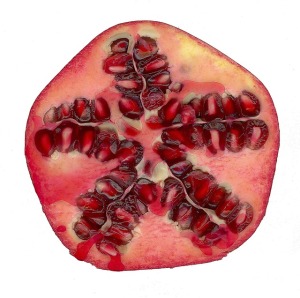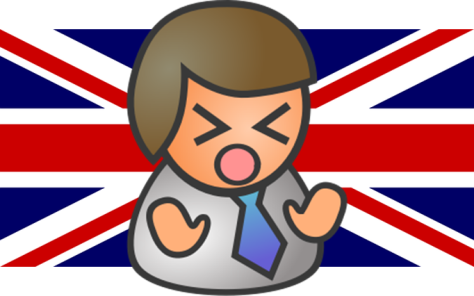‘Whinging pom’ is an expression often used by New Zealanders. It refers, of course, to a complaining English person. If someone is annoying someone else with their moaning, they’ll be told to stop acting like a pom.
It’s not an expression I thought about until I came across an English immigrant whinging about it a few weeks ago, (completely missing the irony of the fact.) It was in an Internet comments section – I know, I know, never read the comments! – so, naturally, the English immigrant’s response to a Kiwi’s comment about ‘whinging poms’ included an attack on the Kiwi’s spelling of the word ‘pom’.
“It should be spelt ‘POME’, as it is an acronym of ‘Prisoner of Mother England’,” they said. And, rather satisfyingly, they were wrong. 
The ‘Prisoner of Mother England’ thing is an etymological myth. It seems that the word ‘pom’ actually comes from ‘pomegranate’ – the red-skinned fruit – because that’s what the British people’s faces looked like when they encountered the Australian sunshine.
But, anyway, the point is that this English person was getting extremely worked up and offended over the Kiwi’s use of the expression ‘whinging pom’. Now, I am an English immigrant myself. I have no problem with the word ‘pom’ – I’ve used it in the title of this very blog, after all – and, thinking about it, I have no problem with the expression ‘whinging pom’ either. It’s a perfectly legitimate stereotype.
 The English are world-class complainers. We freely admit this about ourselves. Complaining is a national pastime. Along with queuing. Which nicely provides us with something else to complain about. It’s no wonder the rest of world has noticed too!
The English are world-class complainers. We freely admit this about ourselves. Complaining is a national pastime. Along with queuing. Which nicely provides us with something else to complain about. It’s no wonder the rest of world has noticed too!
It’s not exactly a recent stereotype. Back in the 1780’s, Johann Wolfgang von Goethe – a very famous German literary figure – journeyed around Italy, writing a diary as he went. At some point, he met some English tourists, who, of course, were noteworthy for the amount of complaining they did.
When my Kiwi boyfriend and I were visiting England’s Lake District last year, we overheard an English couple complaining about their recent holiday to New Zealand: “Oh, it was lovely scenery and everything, but New Zealand’s supposed to have lots of sheep and we hardly saw any, did we? In fact, we’ve seen far more sheep here than we ever saw in New Zealand.”
 Admittedly New Zealand doesn’t have as many sheep per person as it used to, but there’s still a lot!
Admittedly New Zealand doesn’t have as many sheep per person as it used to, but there’s still a lot!
Now, I’m not saying that New Zealanders don’t complain, because of course they do. But they definitely don’t complain as much as English people do. I mean one of the most popular Kiwi expressions is ‘she’ll be right’, which means ‘no worries’. Notice that it’s not a popular English expression.
Kiwis are descended from hardy frontier folk who didn’t have the luxury of complaining. They just had to get on with it. No wonder English people seem particularly whiny to New Zealanders.
 Also, it’s important for New Zealanders to feel superior to the English sometimes. England has often made New Zealanders feel inferior in a ‘you should be grateful to us for being descended from/civilised by us, but you’re only ignorant colonials’ kind of way. I once called someone an ‘ignorant colonial’ and ‘uncultured barbarian’ because they admitted to never having seen Monty Python and the Holy Grail. Needless to say I corrected this oversight and they were more than grateful for it.
Also, it’s important for New Zealanders to feel superior to the English sometimes. England has often made New Zealanders feel inferior in a ‘you should be grateful to us for being descended from/civilised by us, but you’re only ignorant colonials’ kind of way. I once called someone an ‘ignorant colonial’ and ‘uncultured barbarian’ because they admitted to never having seen Monty Python and the Holy Grail. Needless to say I corrected this oversight and they were more than grateful for it.
So, if you’re English, don’t be get all offended by the term ‘whinging pom’. There’s no need. As stereotypes go, it’s pretty fair. Besides, getting offended by it only serves to perpetuate it. Chill out, mate. She’ll be right.

